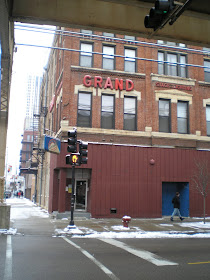 Zepf's Hall, at 122 W. Lake Street (since the renumbering in 1911, 630 W. Lake), was an anarchist hangout during the last 20 years of the 19th century, and played an important role in the Haymarket Affair of 1886.
Zepf's Hall, at 122 W. Lake Street (since the renumbering in 1911, 630 W. Lake), was an anarchist hangout during the last 20 years of the 19th century, and played an important role in the Haymarket Affair of 1886.German immigration to the United States reached its height in the mid- and late-1800s. Many of these immigrants ended up Chicago, where work in factories was easy to find and the youth of the city made it relatively easy to fit in as a newcomer. Most of these settled on the North and Northwest sides -- at that time, the poorer and more remote parts of town. There was always tension between the new immigrants and their longer-tenured neighbors, as demonstrated by the Lager Beer Riots of the 1850s, for instance.
These immigrants brought with them their own culture and heritage, which added to the cultural variety of the city. Some of them also brought the ideals and notions of Socialism, which swept through Europe beginning in the 1860s, but which were relatively unknown in the United States. Only a few of the most radical socialists entertained anarchist notions, but all European immigrants during this period, especially Teutonics, were subject to intense suspicion in America.
This situation was not helped by the radical rhetoric espoused by the largely German editors and writers of the chief workingmen's newspapers in the city, the Arbeiter-Zeitung and The Alarm, who consistently advocated (or at least expressed sympathy for) terrorism.
On May 4, this tension came to fruition in the Haymarket Affair, in which at least ten died. The incident occurred a half-block south of Zepf's on Desplaines St., where a socialist/anarchist rally took place between 8:30 and 10 p.m. The weather was poor, so the event, which had been scheduled to take place in Haymarket Square, was moved up along Desplaines. A variety of activists gave rousing lectures to the group in German and in English. Finally, when the wind picked up and the weather threatened to become even worse, one of the leaders of the rally (and editor of The Alarm), Albert Parsons (who was American-born) came to the stage to announce that, at the end of the next speech, those who were interested could meet at Zepf's for a drink.
The last speaker, Samuel Fielden, spoke powerfully:
A million men hold all the property in this country. The law has no use for the other fifty-four millions. You have nothing more to do with the law except to lay hands on it and throttle it until it makes its last kick...Keep your eye upon it, throttle it, kill it, stab it, do everything to can to wound it -- to impede its progress.
At this point, Parsons, his wife and two children, plus Adolph Fischer, a fellow organizer of the rally, had already left for Zepf's, and were enjoying a beer while waiting for the rally to end.
When the police arrived, Fielden decided not to resist, especially since he was practically finished anyway, and began to climb down from the wagon where he had been speaking. It was at this point that an unknown assailant in the crowd threw a dynamite bomb across Desplaines St., an explosion which shocked the police and led them to begin firing indiscriminately into the crowd and at each other in confusion.
August Spies, a third major organizer of the rally and the editor of the Arbeiter-Zeitung, was sitting on the wagon listening to Fielden when the explosion took place. He immediately began running to Zepf's, where he met up with Parsons and Fisher, and told them what had happened.
In the wake of the Haymarket Affair, Parsons, Fischer, and Spies all were convicted of murder in a show trial and hanged, though certainly none of them threw the bomb, and Parsons and Fischer were at Zepf's at the time of the explosion. The public's disgust with the anarchists' incendiary language, as well as anti-German and anti-immigrant sentiment, sealed their fates.
Zepf's Hall continued to be a meeting place for union members, socialists, and anarchists for the next fifteen years. It closed just after 1900, and the building was repurposed as a shoe factory and later, an engineering and steel manufacturing company. In 1905, Lucy Parsons (Albert's wife), who remained an outspoken advocate of radical socialism throughout her life, returned to the former Zepf's hall for the first time since Haymarket, to speak publicly in support of benefits for the workers employed there.
The Grand Stage Lighting Company has owned the building since the 1970s.
No comments:
Post a Comment